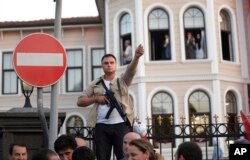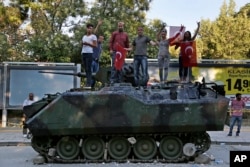Turkish officials continue to arrest judges and military officers in connection with the coup attempt, detaining more soldiers Sunday.
Justice Minister Bekir Bozdag said around 6,000 people have been detained and "the number will increase." Those in custody include the commander of the Third Army Corps, General Erdal Ozturk, who could face charges of treason.
Other high-ranking military officials flew to neighboring Greece by helicopter and requested political asylum. Turkish media reports say some of those who fled are believed to be among the architects of the coup.
Thousands of Turkish citizens packed Ankara's Kizilat Square, downtown Istanbul and the coastal city of Izmir Saturday night to shout their support of President Recep Tayyip Erdogan and his government after a failed coup attempt by some of the country's military.
Crowds waved flags at the late-night rallies and chanted their determination not to let anything or anyone divide the country.
Reports about how many people were killed in clashes during the coup attempt varied, but the latest number available Saturday night was 265 dead, including many civilians. Conditions remained tense in Istanbul, Ankara and some other provincial cities, and there were reports of sporadic continuing violence. Turkish media reported intense clashes at a large military barracks outside Ankara that was believed to be a stronghold of the coup plotters.
Erdogan has accused an exiled Muslim cleric who once was one of his close allies of organizing the plot, and on Saturday demanded his extradition from the United States. The 75-year-old imam, Fethullah Gulen, who has been living in the United States since long before Erdogan came to power, condemned the coup and denied he had anything to do with the military revolt.
WATCH: Fethullah Gulen discusses Turkey attempted coup in impromptu news conference
US, Russian reactions
Russian President Vladimir Putin called Turkish President Erdogan on Sunday. In a statement issued by the Kremlin, Putin expressed "wishes for a speedy restoration of strong constitutional order and stability" in Turkey. The Kremlin said the two leaders also confirmed plans to meet "in the nearest future." Turkish state media said they will meet in the first week of August.
Secretary of State John Kerry spoke to Turkish Foreign Minister Mevlut Cavusoglu late Saturday, a U.S. spokesman said in Washington. Kerry stressed the need for Turkey to respect the rule of law and citizens' rights as it investigates who was involved in the coup plot.
Kerry reiterated Washington's support for the democratically elected government in Turkey, but his spokesman said the top American diplomat also told his Turkish counterpart "that public insinuations or claims about any role by the United States in the failed coup attempt are utterly false and harmful to ... bilateral relations."
The U.S. State Department has also issued a statement warning Americans against travel to Turkey.
Authorities in Turkey said 2,745 judges had been suspended in the wake of the coup attempt — most if not all of them because of alleged links to Gulen. Turkish media also reported that 140 arrest warrants had been issued for members of Turkey's Supreme Court.
The U.S. Defense Department said Turkey closed its airspace to military aircraft following the coup attempt and cut off electrical power to NATO's Incirlik Air Base, home to many U.S. warplanes involved in combat operations against Islamic State militants in Syria. A former senior U.S. diplomat who now lives in Turkey, Matthew Bryza, said this appeared to be a pressure tactic aimed at forcing the United States to hand over Gulen.
"President Erdogan issued a statement saying any country that doesn't help in bringing Mr. Gulen to justice is an enemy of Turkey. Well, he has only one country in mind — the United States," Bryza told VOA.
Kerry said earlier Saturday that any extradition request from Turkey for Gulen's extradition would be judged on the basis of whatever solid evidence of Gulen's wrongdoing Turkey might provide.
Gulen went to the U.S. in 1999 to flee harassment by a former secular government in Turkey that was dominated by the military. He and Erdogan were close allies then, and they remained close for years after Erdogan became prime minister in 2003, but they fell out a few years ago after the Turkish leader assumed the presidency and came under increasing criticism for his autocratic policies.
Gulen spoke to reporters Saturday in the obscure village in eastern Pennsylvania where he now lives. He has been gone from Turkey for so long, he said through an interpreter, that he no longer knows who his supporters in Turkey are. However, he added, he is unaware of any role his followers may have played in the coup attempt.
About 100 Erdogan supporters protested outside Gulen's compound as the elderly cleric spoke to reporters.
Prime Minister Binali Yildrim, who addressed Turks Saturday afternoon, said the military's unsuccessful but bloody attempt to seize power Friday was a "dark stain for the Turkish state."
A former U.S. ambassador to NATO, Kurt Volker, told VOA's Georgian service he was very concerned Erdogan might use the attempted coup as a pretext for becoming more authoritarian than he has been.
"Erdogan, who has already shown some very strong anti-democratic tendencies before the coup, will use the coup plot and the attempt of the generals to take power as a justification for cracking down on society even more. And I think we may see a more restrictive environment for Turkey — less press freedom, less political openness," Volker said.
Western intelligence and military officials were closely monitoring all developments in NATO member Turkey, which has been a key U.S. ally in the war against Islamic State terrorists. Turkey is also a supporter of so-called moderate opposition rebels in Syria looking to overthrow President Bashar al-Assad.
Days before the coup attempt in Istanbul and Ankara, CIA Director John Brennan told reporters there had been disagreements between the United States and Turkey, and not just over Syria, where the U.S. has repeatedly urged Turkey to do more to crack down on IS insurgents.
"There are some things that are going on inside the Turkish political system that are subject to a lot of debate and even controversy," Brennan said. "But I'll just leave it that we do work closely with the Turks. I have very close interaction with my Turkish counterpart."
VOA's National Security Correspondent Jeff Seldin, White House Correspondent Mary Alice Salinas, VOA's Turkish service, VOA's Georgian service, and reporters Ken Schwartz and Isabela Cocoli were among those who contributed to this story.








